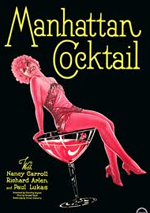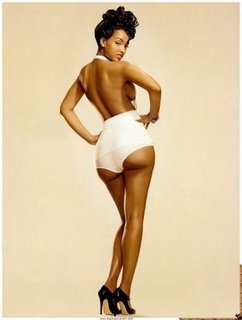What’s the significance of fashion and beauty on The L Word? This question and others are asked by The Ginja Ninja in her recent post. Check it out and come back here for my response!
The Ginja Ninja discusses the characters’ fashion and beauty practices as an enactment of 3rd wave feminism, but I think the rise of lesbian chic and the distinctive subcultural style of LA lesbians are much more influential on the social world of The L Word. There’s a great NY Times article, “The Subtle Power of Lesbian Style,” which discusses the enormous impact LA lesbian style has had in the worlds of fashion and pop culture. Contrary to popular stereotypes, “fashion” and “lesbian” are hardly a contradiction in terms!
In the first episode in which Moira/Max is introduced (as Jenny’s lover), Bette remarks, “I just don’t see why Jenny feels she has to role-play like that.” I don’t think this is an example of the group’s “up-to-date gender politics,” as you assert. To the contrary, this is precisely what 2nd wave lesbian-feminists said about butch/femme! I’ve written a lot on this blog about the dismissal of butch/femme as role-playing, so I won’t repeat myself here. However, we should ask: does this demeaning attitude about butch/femme reflect the LA scene, at least to some degree? I think this attitude–and the presentation of butches as “archaic”–demonstrates some of the show’s profound limitations around gender identity and expression.
I think it’s important not to conflate “feminine lesbians” and “femme.” For example, you refer to Jenny as “unmistakably femme,” but I’m not sure I agree. Many femmes, myself included, feel that femme identity is not just about how you look, and is not equivalent to being conventionally pretty or “feminine” (although some of us are simply ravishing, I must admit). For example, there are (equally ravishing) tomboy femmes, gender-transgressive femmes, etc.
There’s a reason Tila Tequila says she’s into lipstick lesbians! Unlike lipstick lesbians (I know I’m generalizing here), femmes tend to be self-conscious about how we create our gender, which we often experience as complicated–maybe this explains why we’re all blogging! In my experience, femmes have been very engaged in theorizing femme identity in relation to and as part of feminist, queer, genderqueer and transgender discourses and communities. Obviously, this isn’t true of all femmes but it does highlight a point of pride for many of us: as Jewelle Gomez puts it, we refuse to be muted or assimilated.
Where’s the challenge and provocativeness of lesbian sartorial styles on the show? I’m certainly NOT saying that the characters of The L Word are assimilationist because they’re fashionable and/or feminine. Instead, my concern is that lesbian style on The L Word often functions as a vehicle for dissolving and/or absorbing social and cultural difference.
Filed under: Lesbian & Queer Genders, Queer Femininity | Tagged: butch/femme, fashion, lesbian style, The L Word |







Interesting post. Thanks for writing! I’m going to be thinking about this.
-Johanne at http://www.fashioninmotion.wordpress.com
Hey sublimefemme, thanks for your comment! You’re right, I totally didn’t foreground the third-wavey-ness at all, that’s because it’s just a tiny little section really and I’ve explained my take on how it engages with 3rd-wave philosophy (note: engages with, not espouses; it often gets it badly wrong) within the actual dissertation. My experience with the 3rd-wave feminist scene is that people tend to see (I’m not saying I agree with this, just that there seems to be a general feeling) 2nd-wave as being overly restrictive in terms of what elements of pop culture it was okay to engage with (eg. television is an instrument in your oppression, fashion=false-consciousness and the all-sex-is-rape attitude leading to the sex wars of the 1980s (I’m grossly exaggerating, I know!)). So I feel like many 3rd-wave feminists and queers are moving towards an ethic where while they remain critical of the patriarchal aspects of pop culture, they don’t see it as *inherently* problematic to engage with or enjoy these things that have been previously condemned. So while the style-consciousness of The L Word’s characters may be read as just them assimilating into the mainstream, I think the show’s espousal of overtly feminist values shows there may be something more there.
I’m not expressing myself very well, as it’s a complex subject, I haven’t got my ideas all worked out and this blog post is basically just me talking to myself and trying to make some linear sense out of it, hoping people will pull me up on what I get wrong. And I totally agree that they don’t espouse very up-to-date gender values – my point (and I’m not sure that I have one yet) is that the characters *think* that they do, which is what lead to them shunning Moira initially, and their attitude is critiqued within the programme as being essentially classist in origin. Oh, and I’m aware that the whole ‘it’s just role-play’ thing dates back to the 2nd wave as well, I just haven’t come up with a way to work this into my analysis yet.
I disagree, however, that Jenny isn’t femme – she seems to me to be the most self-consciously performative in terms of her dress sense of all the characters and, I feel, has quite a postmodern approach to fashion. She is constantly trying on different identities, sometimes more dykey, sometimes a caracature of a feminine archetype – playing dress-up basically. She is also the most vocally feminist of all the characters, so reading between the lines we might see her as the most likely one to be familiar with queer theory etc. and espouse these values. Of course, it’s TV, and any real radicalness is contained, so we can’t actually see the political nature of her dress-up.
Just some thoughts, feel free to respond! Glad I found your blog, by the way, it might help with my research!
PS. Yeah, I’m studying film and television and we can write about pretty much whatever we want. It’s an undergrad dissertation though, not a doctoral one (I wish)!
Thanks for your response. Hmm…undergrads write dissertations in the UK, who knew? Here in the states the term dissertation is reserved for the work of doctoral candidates. In any case, good luck with your work. I’d be interested to hear how your project develops! -SF PS Glad you’re enjoying the blog.
Yeah we refer to dissertations as just a long essay really, usually 10,000 words. For postgrad work we usually say thesis or PHD. So how would you define femme? Cos that’s definitely how I read Jenny, but you’re not the only one to question that, so I guess maybe my definition needs a little more research…
@theginjaninja Have you by any chance read ‘Televising Queer Women’ Edited by Rebecca Beirne? My good friend Melissa Hidalgo has an awesome essay in the book about SATC titled “Going Native on Wonder Woman’s Island”: The Exoticization of Lesbian Sexuality in Sex and the City..you should check it out! (thought it would help with your dissertation)
Happy new year! I hope to see this year many more intresting posts on your blog!